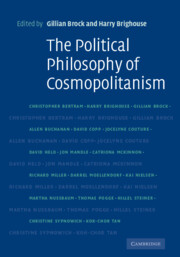Book contents
- Frontmatter
- Contents
- List of contributors
- Preface
- 1 Introduction
- 2 Principles of cosmopolitan order
- 3 Territorial justice and global redistribution
- 4 International justice and the basic needs principle
- 5 Cosmopolitans, cosmopolitanism, and human flourishing
- 6 Global justice, moral development, and democracy
- 7 A cosmopolitan perspective on the global economic order
- 8 In the national interest
- 9 Cosmopolitan respect and patriotic concern
- 10 Persons' interests, states' duties, and global governance
- 11 The demands of justice and national allegiances
- 12 Cosmopolitanism and the compatriot priority principle
- 13 Beyond the social contract: capabilities and global justice
- 14 Tolerating injustice
- 15 Cosmopolitan hope
- Bibliography
- Index
Preface
Published online by Cambridge University Press: 04 December 2009
- Frontmatter
- Contents
- List of contributors
- Preface
- 1 Introduction
- 2 Principles of cosmopolitan order
- 3 Territorial justice and global redistribution
- 4 International justice and the basic needs principle
- 5 Cosmopolitans, cosmopolitanism, and human flourishing
- 6 Global justice, moral development, and democracy
- 7 A cosmopolitan perspective on the global economic order
- 8 In the national interest
- 9 Cosmopolitan respect and patriotic concern
- 10 Persons' interests, states' duties, and global governance
- 11 The demands of justice and national allegiances
- 12 Cosmopolitanism and the compatriot priority principle
- 13 Beyond the social contract: capabilities and global justice
- 14 Tolerating injustice
- 15 Cosmopolitan hope
- Bibliography
- Index
Summary
Trade has internationalized rapidly and labor mobility has increased significantly since the end of the Cold War. These developments have sharply raised questions about the moral significance of national boundaries. What obligations do citizens of wealthy countries have toward the citizens of poorer countries? Are they entitled to restrict the entry of immigrant labor, and if so in what ways? Are they entitled to restrict the exit of capital? Do wealthy citizens of wealthy countries owe more to their less advantaged compatriots than to foreigners who are even poorer? Political theorists have started to address these and related issues. They fall into two broad camps: those who consider national boundaries to have fundamental moral significance, and those who consider them to have no, or only derivative, moral significance. We observed that the latter camp, which we think of as committed to cosmopolitanism, had done a great deal of work countering the claims of nationality, but much less work elaborating the detail of, and defending, a distinctively cosmopolitan political theory. So we asked a number of political theorists whose work embodied a cosmopolitan perspective to write essays contributing to the task of defending a positive political philosophy of cosmopolitanism. This anthology is the result.
Most of the contributions were written specifically for this collection. However, in four cases, some material originally appeared elsewhere.
- Type
- Chapter
- Information
- The Political Philosophy of Cosmopolitanism , pp. ix - xPublisher: Cambridge University PressPrint publication year: 2005

